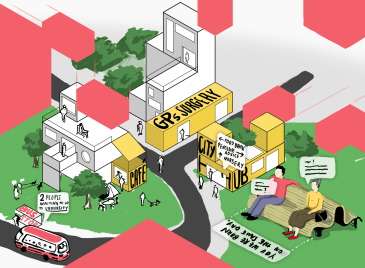What will Bristol be like in 2070? A new report released today [1 October] suggests a number of ideas in an attempt to create a futuristic city that suits the needs of its citizens, whatever their age.
Towards the All-Age Friendly City finds that meeting people, better designed housing and transport, and feeling secure are key to a friendly city.
Lego-inspired housing that can grow or shrink in relation to family size, face recognition that triggers personalised services or advertisments, and an internal communications network which warns of impending illness and can dispatch an ambulance are all suggested as ideas for cities of the future.
The report is the result of a collaboration between Future Cities Catapult and the University of Bristol's Graduate School of Education, who undertook the research and produced the report. Support was also given by the Arts and Humanities Research Council Connected Communities Programme.
Placed at the intersection between the World Health Organisation's work on age-friendly cities and UNICEF's work on child-friendly cities, it aims to spot potential conflicts in the design and use of cities by older and younger citizens - groups who are usually overlooked in the planning of cities.
As well as looking at conflicts, the research also explores areas of common need that are used by people of all ages.
The report examines a number of case studies from around the world, where cities are already implementing all-age-friendly city solutions, and suggests how these might be improved.
Professor Keri Facer and Dr Helen Manchester, co-directors of the project, said: "The All-Age Friendly City is an achievable dream. What we need now is for engineers, architects, planners and policy makers to engage a much wider range of age groups in the design and development of our future cities. Re-imagining 'Smart Cities' not as technological fantasies, but as livable cities for everyone whatever their age, is an urgent technical, political and economic challenge'
To create its recommendations, the report explores a number of future scenarios for our cities as a starting point to reimagine systems and processes, such as increased sea levels, regional devolution, or car free streets.
The report draws on input from an expert group including the BBC, Bristol City Council, Academic and Professional specialists in gerontology and childcare, as well as The Royal Institute of British Architects and Pervasive Media Studios.
More information: The complete report is available online: www.futurecities.catapult.org.uk/
Provided by University of Bristol






















